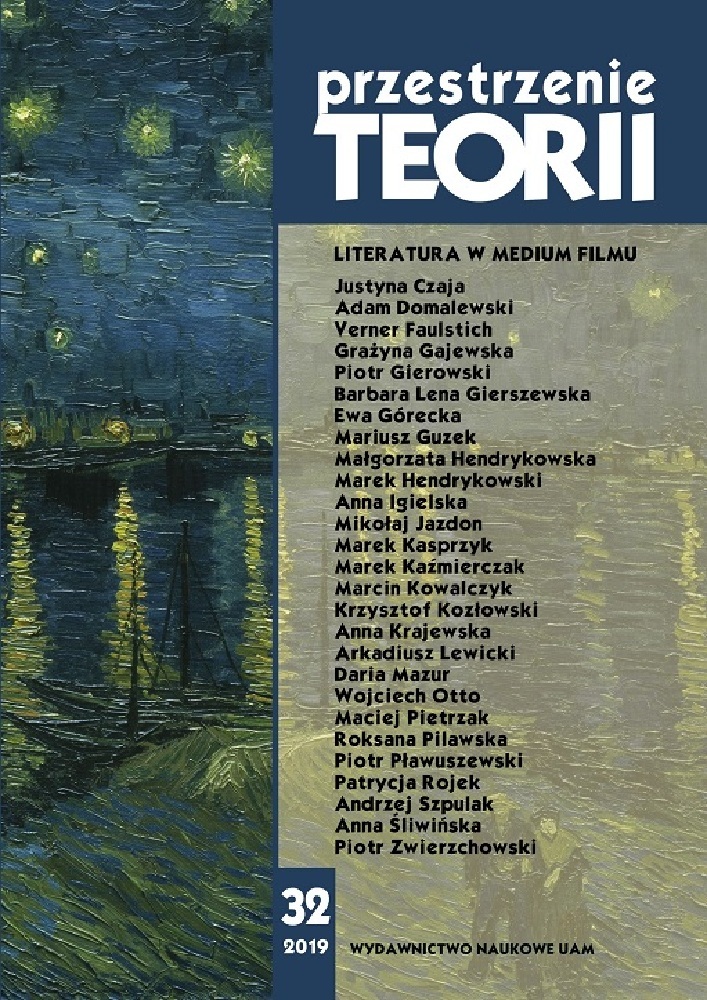Abstract
Pietrzak Maciej, O-bi, o-ba: Koniec cywilizacji – postpiśmienny świat Piotra Szulkina [O-Bi, O-Ba: The End of Civilization – The Postliterate World of Piotr Szulkin]. „Przestrzenie Teorii” nr 32. Poznań 2019, Adam Mickiewicz University Press, pp. 273–284. ISSN 1644-6763. DOI 10.14746/pt.2019.32.14.
Piotr Szulkin made his mark in the history of cinema primarily as the author of disturbing visions of the future. His four films made between 1979 and 1985 comprised the science-fiction tetralogy, which is still one of the greatest artistic achievements of this genre in Polish cinema. The subject of the article is the third production of Szulkin’s series – the post-apocalyptic film O-Bi, O-Ba: The End of Civilization from 1984. In the film, the director creates a suggestive vision of a world destroyed as a result of nuclear conflict, in which the original functions of literature and the written word are forgotten. The author article analyzes the way in which forsaken literary artifacts are used in the post-literary reality of the film. An important element of his considerations is also the post-apocalyptic reception of the biblical text, on whose elements the mythology of the film’s world is based.
References
Dróżdż A., Od liber mundi do hipertekstu. Książka w świecie utopii, Warszawa 2009.
Florysiak W., Sny lękowe o przyszłości, czyli science-fiction Szulkina, „Film” 1985, nr 5, s. 10–11.
Gruszewska-Blaim L., Dystopianising the Dystopian: Piotr Szulkin’s Film Tetralogy, [w:] Dystopia(n) Matters: On the Page, on Screen, on Stage, red. F. Vieira, Newcastle upon Tyne 2013, s. 202–215.
Jamrozik Ż., Sonic Fictions: Afrofuturistic Readings of Piotr Szulkin’s The War of the Worlds: Next Century (1981) and Łukasz Barczyk’s Unmoved Mover (2008), “Studies in Eastern European Cinema” 2017, t. 8, nr 2, s. 174–192.
Kijowski A.T., A kiedy strzelba wypali… (Poetyka rekwizytu), „Teksty: Teoria Literatury, Krytyka, Interpretacja” 1977, nr 1, s. 68–88.
Kletowski P., Marecki P., Piotr Szulkin. Życiopis, Kraków 2012.
Konfenał J.S., Piotr Szulkin: katastrofy logosu i absurdy istnienia, „Kwartalnik Filmowy” 2018, nr 104, s. 216–228.
Loska K., The Apocalyptic Imagination in the Films of Piotr Szulkin, „Maska” 2017, nr 35, s. 11–22.
Maciejewski Ł., Podsycanie bestii moich. Kino Piotra Szulkina, „Cinema Polska” 2004, nr 1, s. 36–39.
Mazurkiewicz A., Między fantastyką i aluzją. Social fiction jako kryptopolityczny nurt polskiej literatury lat siedemdziesiątych i osiemdziesiątych XX wieku, „Folia Litteraria Polonica” 2011, nr 14, s. 178–191.
Oramus D., O pomieszaniu gatunków: science fiction a postmodernizm, Warszawa 2010.
Pawlicki M., Apokalipsa według cynika, „Film” 1987, nr 3, s. 3–5, 19.
Przylipiak M., Światy Piotra Szulkina, „Kino” 1988, nr 2, s. 18–21.
Sławińska N., Cud. O realizacji filmu Piotra Szulkina „O-bi, O-ba”, „Film” 1984, nr 25, s. 6–8.
Smoczyński R., Zakneblowany prorok, „Film” 2002, nr 11, s. 76–79.
Sobolewski T., Niech zło zwycięża. O filmach Piotra Szulkina, „Film” 1980, nr 1, s. 8–9.
Świdziński W., Biegun cielesności w twórczości filmowej Piotra Szulkina, „Pleograf. Kwartalnik Akademii Polskiego Filmu” 2018, nr 1, s. 1–12.
Szulkin P., A-344 poz. 366 Stenogram – Stenogram z posiedzenia Komisji Kolaudacyjnej Filmów Fabularnych w dniu 22 czerwca 1984, 1984.
Szulkin P., Fascynująca zagłada ludzkości, „Kino” 1984, nr 12, s. 10–14.
Szulkin P., O bi, O ba, [w:] O bi, o ba i inne prawdziwe nowele filmowe, Warszawa 1984, s. 87–141.
Wierel K., Księga w nie-ludzkim świecie. Motyw Księgi w postapokaliptycznych przekazach literackich i filmowych XX i XXI wieku, Białystok 2019.
Zarębski K.J., O-bi, O-ba. Koniec cywilizacji, „Filmowy serwis prasowy” 1984, nr 24, s. 2–4.
License
Authors
Authors of texts accepted for publication in Przestrzenie Teorii are required to complete, sign and return to the editor's office the Agreement for granting a royalty-free license to works with a commitment to grant a CC sub-license.
Under the agreement, the authors of texts published in Przestrzenie Teorii grant the Adam Mickiewicz University in Poznań a non-exclusive, royalty-free license and authorize the use of Attribution-NonCommercial-NoDerivatives 4.0 International (CC BY-NC-ND 4.0) Creative Commons sub-license.
The authors retain the right to continue the free disposal of the work.
Users
Interested Internet users are entitled to use works published in Przestrzenie Teorii since 2015, for non-commercial purposes only, under the following conditions:
- attribution - obligation to provide, together with the distributed work, information about the authorship, title, source (link to the original work, DOI) and the license itself.
- no derivatives - the work must be preserved in its original form, without the author's consent it is not possible to distribute the modified work, such as translations, publications, etc.
Copyrights are reserved for all texts published before 2015.
Miscellaneous
Adam Mickiewicz University in Poznań retains the right to magazines as a whole (layout, graphic form, title, cover design, logo etc.).

